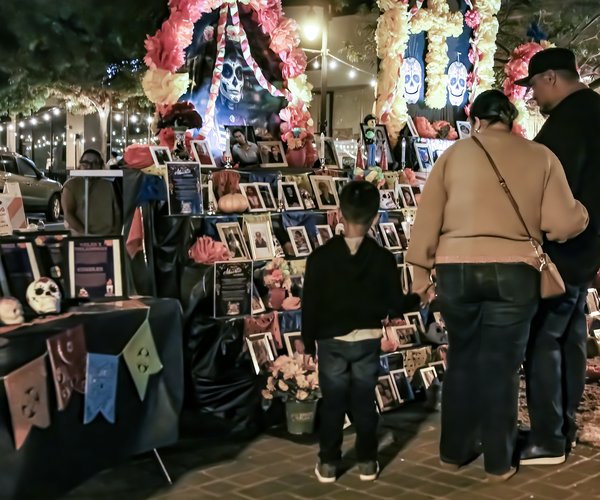South Country Crisis Center in Manteca is still open for business.
While it’s true that the non-profit program for victims of domestic violence has been on critical fiscal life support the last few years, news about its permanent demise is a bit exaggerated, said executive director Lyn Price.
“It’s still operating,” said Price who was standing in triple-digit sizzling heat in the fireworks booth at Calvary Community Church during the interview on Wednesday.
The Crisis Center was one of the non-profit, tax-exempt organizations picked at random to sell Safe and Sane July Fourth fireworks as a fund-raiser. This is the second time the organization has had the luck to be selected, Price said.
“Even if we were closing, we still have bills to pay. You just can’t close and leave bills, so that’s why we’re having a fundraiser,” she said in response to inquiries as to why the Crisis Center is still having a fundraiser when their doors are closed.
One such inquiry e-mailed to the Manteca Bulletin asked: “If the South County Crisis Center is closing this month, why are they running a firework(s) booth and where is the money going?”
Price added that the other reason they are conducting the fireworks fund-raiser is because, “I’m under contract to sell the fireworks. They (Phantom Fireworks) pay a lot of money up front – they pay for our business license, our permits.”
She said they hope to raise $10,000 from the fireworks booth this year. Two years ago, the first time they had the same booth, they cleared about $8,000.
“That’s not enough to keep us going, but it’s enough to help us get through to the next fund-raiser. But we’ll still have the same problem as before,” she explained.
In fact, she said, “six years ago was when we started to get into a lot of financial debt, before I came on (board). They were going to close it then. They already announced it six years ago. And I said I would come in for little or no pay to keep it open.”
To keep the programs going and to maintain the office, they need a budget of at least $105,000 a year. “That’s including my pay and office staff who also has to forgo office pay to keep the place open. I pay one other facilitator, but most of my classes I teach myself,” she said.
“Last year, I did it on $52,000 out of a budget that should have been $105,000.”
The program actually has been operating “for six years with very, very little money. I’ve volunteered my time as director for years; I’m working with no pay at all,” Price said.
There are a couple of people who are “under contract to help me a few hours a day, and they get $25 a day; they don’t even get minimum wage, but that’s what they agreed upon,” said Price who started out as office manager of the Crisis Center for two and a half years, a paid position, before she became the director.
Funding sources from United Way, Raymus Foundation, block grants
The Crisis Center receives funding from a number of sources. They include $20,000 from United Way, $5,000 from Marie and Antone Raymus Foundation, and $2,500 from the Community Development Block Grant federal money which is funneled through San Joaquin County and finally through the local city government. However, these sources are not consistent every year, Price pointed out.
The Raymus fund, for example, is money that “we don’t get …every year, but we got it this year,” she said.
The CDBG block grants are also awarded stringently, with applicants such as the Crisis Center more often than not receiving only a fraction of what they apply for. “We didn’t get nearly as much as we asked for,” she said of the block grant.
“I do try to get grants from other sources,” Price said, but the result is not always guaranteed.
One good news for the Crisis Center is that it does not have to worry about paying a lease or rent for the building on West Center Street located on the northwest side of the Union Pacific Railroad tracks. It is “owned” by the non-profit program by virtue of the terms of occupancy set in place by the late Manteca philanthropist and real estate developer Antone Raymus who owned the property. The first non-profit program to use the facility was the now-defunct Love Thy neighbor, an all-volunteer charitable organization ran by the late Frances Bynum. Raymus was prompted to offer the use of his building so that Bynum could take her philanthropic project out of her garage where she had been running it for years.
Should the South County Crisis Center close its doors, the property has to be given to another non-profit agency, according to the occupancy terms laid out years ago.
But while the Crisis Center does not have to worry about rent, it does have other bills to pay. These include materials for classes offered, property taxes, insurance, and utilities.
“We still have all those debts,” Price said, adding, “Ninety percent of all the money that comes in to South County Crisis Center is for our clients.”
According to the program’s web site, the Crisis Center reaches an “estimated 1,600 individuals annually with support services” that include emergency shelter, food, clothing and referrals for victims of domestic violence “necessary to continue in their time of need.” The main objective of the center, it further states, is “to provide for a safe, confidential, non-judgmental place where victims of domestic violence can gain self-esteem, self-reliance and empowerment over their lives.”
The 501c3 organization was launched 13 years ago and was “the vision of Veronica DeBrum and Ruth Ann Wood after four murders were committed in Manteca directly related to domestic violence.”
The program serves residents not only in Manteca, Tracy, Lathrop, Ripon and French Camp but also those in surrounding areas including those outside of San Joaquin County, Price said.
The Crisis Center had an opportunity to expand in 2007 when a satellite office was opened in Ripon with the Ripon Police Department. That is no longer the case, said Price.
DeBrum and Wood are no longer with the Crisis Center. Two years ago, former Ripon Mayor Curt Pernice stepped down as president of the center’s board of directors. The position is now occupied by Price’s husband, David, who took over about a week ago but has been on the board for nine years.
Even with operating budget at shoe-string levels, the Crisis Center was still able to help 1,300 people last year “with our classes,” Price said. They also gave out food and clothing during the past Thanksgiving and Christmas holidays, including 300 toys for children.
“Our biggest problem is finding people who will work for nothing. The South County Crisis Center has the lowest-paid director that I’ve heard of, and I’ve known quite a few of them. So that’s our biggest hurdle – finding someone who wants to do this (work) for free,” Price said.
The Crisis Center’s fireworks booth in the parking lot of Community Calvary Church on East Lathrop Road (just east of Union Road) will be open today from 10 a.m. to 11 p.m., and on Thursday, the Fourth of July, from 9 a.m. until noon. Donations are also welcome.
Some members of the board of directors actually did not want to go ahead with the fireworks booth fund-raiser, Price said. “But for the past two years we were on the edge of closing the door, and I still have to pay the bills, and they don’t understand that.”
For more information about the Crisis Center, call (209) 824-0586. Office hours are Monday to Thursday from 9 a.m. to 1 p.m. Classes that include anger management for teens and adults, conflict resolution, financial life skills, gang awareness and self-esteem, are held in the afternoon and in the evening.
Fiscal crisis for S. County Crisis Center
Still in business but on critical list for financial life support






